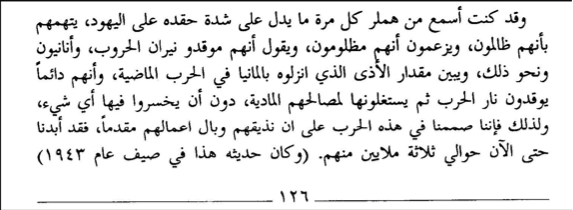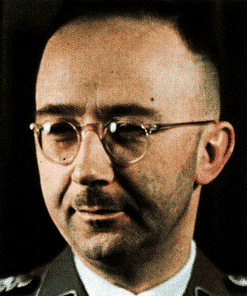

Re: Did
Himmler ever admit to "Three Million"?
COMMENTS
BY OUR READERS:
 Middle
East expert Eric
Müller, Texas:
Middle
East expert Eric
Müller, Texas:
HERE is my
translation of that passage, a rather literal
translation:
"I used to hear coming from Himmler all the time
[things] that showed the intensity of his hatred
for the Jews. He accused them of being
oppressors/wrongdoers while they claim to be
oppressed/wronged. He would say that they lit the fires
of wars, that they are egotists, and that sort of thing,
showing the extent of harm that they had brought down on
Germany in the previous war and that they were always
igniting the fires of war and then using them for their
material interests, without losing anything in them
themselves. Therefore we have determined to give them a
taste of the evil consequences of their actions in
advance. We have so far exterminated about three million
of them. (This talk with him was in the summer of the
year 1943)."
The verb in question - abadna ("we have
exterminated") - is translated as "destroy, exterminate,
extirpate" by the best academic Arabic-English dictionary
(the Hans Wehr dictionary, which ironically is an English
translation of an Arabic-German dictionary - the result
of a project originally begun in the Third Reich
supposedly with the aim of translating Mein Kampf
into Arabic.)
The verbal noun "ibadah," derived from that
verb, means "extermination" and "ibadah jama'iya"
or "collective 'ibadah'" is the modern Arabic expression
used for the word 'genocide.' Another derivative of the
same root, "mubeed" (literally, the thing that
does the 'ibadah'), is the Arabic word for
pesticide.
So the Arabic verb 'adadna' really pretty much
has to mean "we exterminated," though I suppose with a
slight stretch you might translate it as "we have got rid
of"
But of course, I'm sure
Himmler didn't speak to the Mufti in Arabic and I
don't think the Mufti spoke very much German so this
is the Mufti's recollection many years later the fact
of a conversation through the intermediary of an
interpreter.
The statement also could be an effort by the Mufti to
distance himself from the supposed extremism of the
Nazis. I don't know when these memoirs were supposedly
written, but already by the 1960s the Arabs who were
engaged in fighting the Zionists had all realigned with
the Soviets. So public expressions of enthusiasm for the
Nazis wouldn't have been welcome politically at that
point.
 ALSO, I've just now been trying to track down some
information about the source of that quote, the "Memoirs
of al-Hajj Muhammad Amin al-Husayni" edited by 'Abd
al-Karim al-'Umar and published in Damascus in 1999.
Obviously that's 25 years after the Mufti died and in a
quarter century one could accomplish a great deal of
creative "editing" if the Mufti hadn't thoroughly
reworked the incidents in his own mind and writing
himself.
ALSO, I've just now been trying to track down some
information about the source of that quote, the "Memoirs
of al-Hajj Muhammad Amin al-Husayni" edited by 'Abd
al-Karim al-'Umar and published in Damascus in 1999.
Obviously that's 25 years after the Mufti died and in a
quarter century one could accomplish a great deal of
creative "editing" if the Mufti hadn't thoroughly
reworked the incidents in his own mind and writing
himself.
My first question is whether the 1999 edition was a
reprint or a new book. The second thing I want to find
out is who 'Abd al-Karim al-'Umar is and what he has to
do with the Mufti and where these memoirs were for 25
years prior to 1999.
I looked up the on-line catalogues of the two big
Arabic bookdealers (based in Beirut) from which I've
bought books on several occasions to search for this
title and the editor and neither one pulls up anything -
which is a little odd, though by no means impossible.
That part of the world is not known for efficiency and
order. Still, those websites regularly throw up even
out-of-print books (because you can contact the store and
ask for them to hunt down copies of such items). So it's
a bit strange that they don't pull up anything.
Anyhow, I'll let you know what more I find.
I heard several years ago that Rashid Ali
al-Gilani, the Iraqi Prime Minister who spent time in
Berlin and then fled to Saudi Arabia after the war, also
left some manuscript memoirs behind - either in Berlin
when he left or after he died in the 1960s. I also heard
that the Egyptian editor of the Magazine Uktubir
("October") - formerly one of Sadat's pet publications,
so definitely tied to the Egyptian state machine - had
got hold of the manuscript and was thoroughly rewriting
it for 'publication'. I don't think that ever was
published - thank God. But the apparent interval of 25
years between the death of the Mufti and the publication
of his 'memoirs' is rather unnerving in light of that
sort of 'editing.'